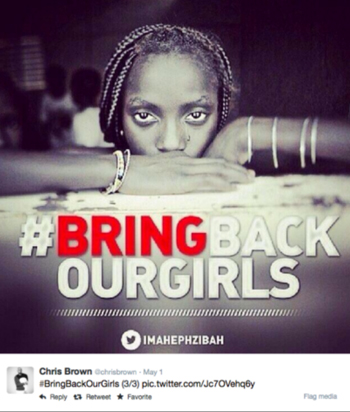
It may have taken a few weeks, but the world’s attention has fixated on terrorist abductions in Nigeria, thanks, in large part, to a hashtag.
On April 14, at a school in the Nigerian town of Chibok, 276 schoolgirls were kidnapped while taking their final exams. The girls were taken by the extremist group known as Boko Haram (which roughly translates as “Western education is sinful”), who had disguised themselves as soldiers and forced the girls up into the back of trucks. Yet in the days that followed, appallingly little was done to help. The Nigerian military falsely claimed it had rescued the girls — only to retract the claim the very next day. The story barely registered with the international media.
Then, on April 23, Oby Ezekwesili, vice president of the World Bank for Africa, gave a speech in Nigeria in which she urged the government to intervene and “bring back our girls.” Soon after, Twitter users in Nigeria began to repeat her call, adopting the hashtag #BringBackOurGirls.
“This was not a coordinated campaign,” Ibrahim M Abdullahi, a lawyer in the Nigerian capital Abuja, told the BBC. “It was a number of individuals in Nigeria tweeting to raise awareness in the hope that the international community would eventually take notice.” By the time reports emerged that kidnappers had taken some of the girls over state lines to Cameroon and Chad and sold off as sex slaves, #BringBackOurGirls was beginning to do just that. A few days later, it had exploded around the world and, now, more than a million tweets have been sent with the hashtag, including those sent by Hillary Clinton and, somewhat surprisingly, Chris Brown. This timelapse map shows how the hashtag went viral:
Yet how much can a social media campaign actually help?
The #BringBackOurGirls campaign has obvious parallels with #Kony2012, the well-intentioned but ultimately ill-conceived campaign launched by California-based NGO Invisible Children. The #Kony2012 campaign video outlined the organization’s goal to stop the Ugandan militiaman and cult leader Joseph Kony, whose Lord’s Resistance Army recruited child soldiers, and it clearly resonated on social media, becoming the most viral video of all time. Yet, the video lacked important context about the issue and, despite the worldwide attention, the campaign fizzled out spectacularly; a follow-up video on Kony failed to garner even a fraction of the attention on social media, though it was released just a month after the first. Today, Kony and the LRA are still free and continue to recruit child soldiers.
Yet there are important differences between the two campaigns. #BringBackYourGirls began, and remains strong, within Nigeria, whereas #Kony2012 was a case of outsiders looking in — and often missing the mark. The Nigerians who’ve taken up the cause of the kidnapped schoolgirls are familiar with the atrocities perpetrated by Boko Haram, a complex and amorphous group that’s been operating in Nigeria since the early 2000s. Even more problematic is the fact that past attempts by the Nigerian military to stop Boko Haram have resulted in the deaths of dozens of innocent Nigerians.
Promisingly, #BringBackOurGirls has prompted physical protests, both within Nigeria and around the world, which in turn has stirred Nigerian President Goodluck Jonathan to promise, “wherever these girls are, we’ll get them out.” Nigerian police are now offering a reward of $300,000 for the rescue of the girls. And the Obama administration announced Tuesday they’re sending military officials and hostage negotiators to Nigeria to aid in the recovery efforts.
There’s still a danger that the flood of attention now being focused on the kidnapped girls will ultimately lead people to tune out, particularly if the search for the girls drags on interminably. But the worldwide attention has put Boko Haram on the radar, which means that subsequent crimes and attacks committed by the group are much more likely to garner international media attention, even if they’re on a smaller scale. Just this week, it was reported that Boko Haram had kidnapped another, much smaller, group of girls in Nigeria, as it has done sporadically for years. But this time, the news of the smaller scale kidnapping was reported widely and quickly, by international media outlets.
It’s true that a hashtag alone can’t even begin to combat the multiple systemic problems that have worked in conjunction to allow 276 girls to be taken from their very school, but it has shed some light on those problems. And even though it’s true that not every person who has tweeted #BringBackOurGirls will give much thought to the Nigerian schoolgirls, the attention generated by the hashtag means that important people around the world are now doing just that.
More Must-Reads From TIME
- The 100 Most Influential People of 2024
- Coco Gauff Is Playing for Herself Now
- Scenes From Pro-Palestinian Encampments Across U.S. Universities
- 6 Compliments That Land Every Time
- If You're Dating Right Now , You're Brave: Column
- The AI That Could Heal a Divided Internet
- Fallout Is a Brilliant Model for the Future of Video Game Adaptations
- Want Weekly Recs on What to Watch, Read, and More? Sign Up for Worth Your Time
Contact us at letters@time.com